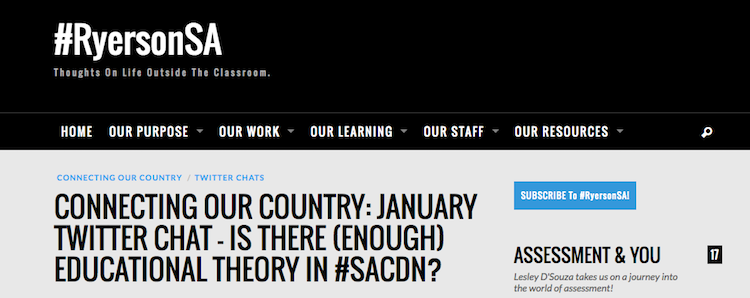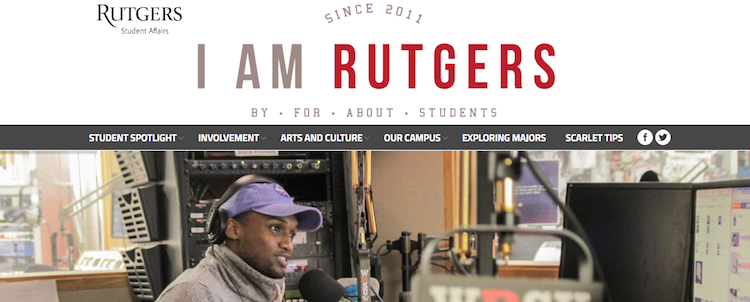“No matter what, the very first piece of social media real estate I’d start with is a blog.”
Those who work in higher education and student affairs are responsible for serving our students through sharing resources, offering advice and various opportunities for their personal and professional development. The use of technology knows no bounds as it also is now essential to how it is utilized student affairs offices, professionals and student leaders, fulfilling many of our responsibilities.
Here we go into the benefits of blogging, with examples of sites and content. Before I dig in with our top tips, I want to address a few reasons why people may avoid a platform like blogging.
Blogging Myths Debunked
When we are thinking of a different way to improve our engagement with students and the greater campus community we should consider the use of blogging.
Before I get into why, I want to address some of the misconceptions about blogs for those who may be hesitant to start one:
People don’t read blogs. It’s clear that’s not the case, otherwise you may not be reading this post right now. People read blogs for different reasons and one of the most common reasons is to obtain new information and perspectives.
Blogging is like a journal. It can be used like a journal if you decide to design or market your blog in that way. A blog does not have to be completely made up of personal stories and reflections. It also does not have to be updated everyday.
You need an established following prior to creating your blog in order for your blog to be successful. Do you really think people create blogs so they can share with people that already know them? Partly yes, however, most people create a blog with an intent that their audience will increase and reach an audience they wouldn’t have otherwise met offline.
Successful Student Life Blogs
Examples of two blogs we deem successful and are a good starting point to get ideas from include #RyersonSA and I Am Rutgers.
The #RyersonSA blog was made for the entire division of student affairs staff members at Ryerson University, however, their blog also focuses on the larger community: the content centers on development. Through the blog staff members are encouraged to engage with each other across the division and can inform each other about the roles, programs, updates, and initiatives that can impact the divisional development as a whole. Ryerson also runs a Ryerson Student Life blog primarily for student updates and sharing stories.

The I Am Rutgers blog is student-run and designed for Rutgers University students to learn about the different experiences that RU students have.

The Benefits of Blogging
Almost every department or office in student affairs or student life divisions as one entity can benefit from having a blog. Do you already have a place online where students can connect? You have an opportunity to make into what students need, drive student engagement and build relationships among all different types of students and professionals from all over campus.
Here are some of the top ways your division can benefit from blogging:
1. Attracts potential students to your institution
Potential students will search for your university or college, and your campus life blog may be one of the first sites they interact with. They’ll be able to connect with current students and get an idea if they’ll fit in or find a home away from home somewhere on campus.
Giving students a platform to share their voice shows applicants that the institution puts a lot of value on student body involvement. Current students can showcase what they’re passionate about and reflect on their campus involvement.
2. Helps students answer questions
Blogs can help students in a myriad of ways. The best blogs in student affairs or campus life answer common questions that students have in an unique way that captures their attention. These blog posts will then become a particularly handy tool for student leaders who need to refer to resources and can easily share a blog post via social media to a new student.
For example, a residence life and housing department could publish a ‘how-to’ maintenance blog post and show students step-by-step who to submit a work order, etc. etc. There are so many ways institutions can leverage a blog to reach a wide variety of students (i.e. on and off campus, international students).
3. Offers a new leadership opportunities for introverted students
Often when students think about leadership positions, they think of an Orientation Leader, Resident Assistant, or someone who needs be constantly building, forming, and connecting with others. For introverts, who gain their energy by working on their own, offering a leadership position in editing, writing, and strategizing in a different environment can offer them a way to develop on skills without draining all of their energy.
4. Helps students develop literacy among various mediums
Blogging can incorporate more than just writing content.
Students can develop skills through podcasting (SoundCloud), video blogging (YouTube), and making a presentation (SlideShare). Each medium has the opportunity to reach a different audience and engage with different groups of students.
5. Prepares students for their chosen career path
Students have the opportunity to elevate their voices and thoughts while writing or managing a blog. Blog contribution and management will also aims to improve students’ skills in technology, communication, and time management. This could be an opportunity for those students who are studying communications, marketing, public relations, or those students who are interested in pursuing a career in higher education.
When was the last time a student ‘positive googled’ their name? A side-effect from writing and creative content is having a digital identity all over the web. It’s another way for them to build their reputation in a positive way.
Different Types of Blog Posts
Here are suggestions on what type of posts both students and staff can create:
- Student Spotlight – This post can highlight a student leader or a student worker; helps their peers learn more about them and the impact that they have on the department/student organization. Depending on how the blog is organized, this can be a post that is done once a month or once a week.
- Staff Spotlight – Similar to the student spotlight, this post can highlight a staff member that students engage with often so that they can get to learn more about them personal and professional level. I would also challenge the office to highlight staff members who students don’t interact with often. Sometimes knowing that behind the responsibilities, there is still a real person with interests that likes the work that they do.
- List-acles – There’s always room for a top 10 list, just be sure to make it funny and to get the suggestions from students. An added plus if you get the students to come up with the topic or the reasons.
- Office Updates – Having a blog can help your office be more transparent with your students. You can provide updates about new staff additions, deadlines, leadership or job opportunities, new initiatives, etc.
- Contests or Raffles – Who doesn’t like the chance to win something free? This can also help students understand where offices are on-campus.
- Shared Reflections – Having students reflect on experiences that they had (responding to a large speaker event, study abroad, community service, internship, a field trip, etc.) helps provide perspective for students who may be looking for more to do on and off campus or needs that second opinion about an opportunity that they are considering. I highly recommend written and vlog (video blogs) posts for this.
- A Day in the Life – Office blogs could be utilized as a marketing tool, especially for those that may be responsible for recruiting prospective students and emerging student leaders such as admissions, residence life (during the resident assistant selection process), and greek life.
Your Thoughts!
How has having a blog impacted your department and student engagement?
If you are still considering starting a blog, what features are you considering?
Is your office blog student-run?
Continue the conversation by tweeting us @themoderncampus. Happy blogging!





